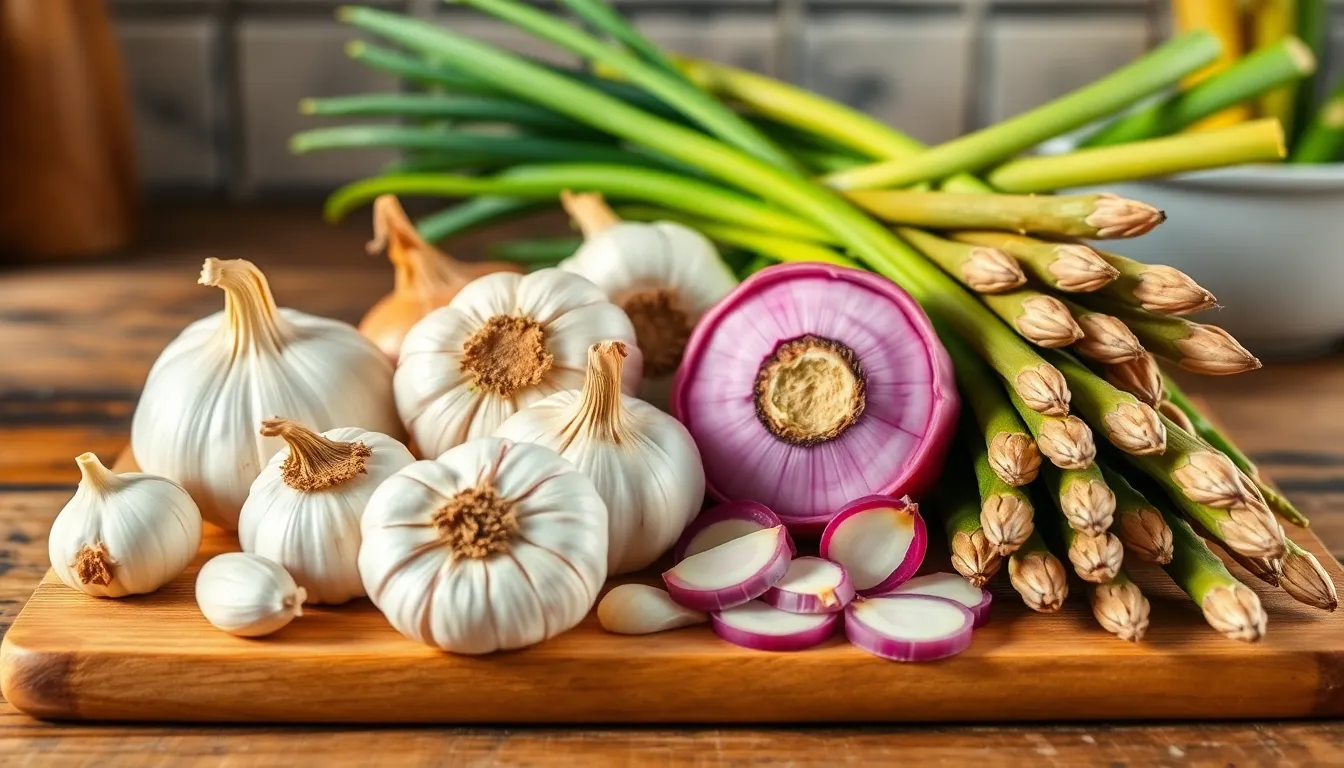In a world filled with trendy diets and superfoods, prebiotic foods are the unsung heroes of gut health. They’re like the friendly sidekicks that help probiotics—the superheroes—do their job better. Imagine your gut as a bustling city; prebiotics are the nutritious compost that keeps the streets clean and the citizens happy. Without them, things can get pretty messy.
So why should anyone care about these fiber-packed wonders? Because they’re not just good for digestion; they can boost immunity, improve mood, and even help with weight management. From bananas to chicory root, prebiotic foods are waiting to be discovered. Get ready to unlock the secrets of a healthier gut and enjoy the delicious journey along the way. Who knew eating could be this much fun?
Table of Contents
ToggleOverview of Prebiotic Foods
Prebiotic foods contain non-digestible fibers that nourish beneficial gut bacteria. These foods play a critical role in enhancing overall gut health. Common examples include bananas, chicory root, garlic, onions, asparagus, and leeks. Each of these foods supplies unique types of prebiotic fibers.
Bananas, particularly when slightly unripe, contain resistant starch that promotes the growth of probiotics. Chicory root is rich in inulin, a potent prebiotic fiber that supports digestion. Garlic and onions both provide fructooligosaccharides (FOS), which encourage the flourishing of healthy gut flora.
Consumption of prebiotic foods offers multiple benefits. Health improvement includes better digestion, enhanced immunity, and even mood regulation. Improved satiety can aid in weight management, making these foods a valuable addition to a balanced diet.
Individuals incorporating a variety of prebiotic foods into their meals often experience significant gut health benefits. Dietary diversity not only supports beneficial bacteria but also enhances nutrient absorption. Research indicates that a thriving gut microbiome correlates with a stronger immune system, further emphasizing the importance of these foods.
Including prebiotic-rich options in daily meals promotes sustained health and well-being. Whether in smoothies, salads, or cooked dishes, they offer versatile and tasty methods of improving gut health.
Benefits of Prebiotic Foods

Prebiotic foods provide several health benefits, primarily supporting gut and immune health. Understanding these advantages helps in making informed dietary choices.
Digestive Health
Improved digestion stems from prebiotic foods that promote the growth of beneficial gut bacteria. Foods like garlic and onions contain non-digestible fibers that enhance gut flora balance. Increased fiber intake leads to regular bowel movements and reduced digestive discomfort. Incorporation of prebiotic foods can also alleviate symptoms related to irritable bowel syndrome. For example, inulin-rich foods like chicory root enhance nutrient absorption, contributing to overall gut health. A thriving gut microbiome, supported by prebiotics, encourages effective digestion and nutrient utilization.
Immune System Support
Prebiotic foods offer key benefits for the immune system. Nourishing beneficial bacteria in the gut strengthens immune function. The presence of fiber-rich foods like leeks and asparagus promotes the production of short-chain fatty acids, which have anti-inflammatory properties. Enhanced gut health leads to improved pathogen resistance, reducing the likelihood of infections. A strong connection exists between gut health and overall immunity, making prebiotics essential for maintaining wellness. Regular consumption of prebiotic foods can lead to a reduced incidence of illnesses and enhanced recovery times.
Common Prebiotic Foods
Prebiotic foods play a vital role in gut health by providing fibers that nourish beneficial bacteria. Incorporating these foods into the diet enhances overall wellness.
Fruits and Vegetables
Fruits and vegetables abound with prebiotic fibers. Bananas contain resistant starch, beneficial for digestion. Chicory root offers a high concentration of inulin, a powerful prebiotic. Garlic supports gut flora with fructans, promoting microbial balance. Onions and leeks deliver quercetin while improving gut bacteria. Artichokes also stand out, supplying both inulin and antioxidant properties. Each of these options enhances gut health and bolsters the immune system, making them essential components of a nutritious diet.
Grains and Legumes
Grains and legumes are excellent sources of prebiotics. Oats contain beta-glucan, which supports gut bacteria and promotes satiety. Barley offers similar benefits, acting as a fiber-rich companion in meals. Legumes, including lentils and chickpeas, provide resistant starch and a variety of other nutrients. They significantly improve digestive health and nutrient absorption. Quinoa stands out too, supplying both protein and prebiotic fibers. Relying on these grains and legumes can transform meal preparation while enhancing gut microbiome functionality.
How to Incorporate Prebiotic Foods into Your Diet
Including prebiotic foods in daily meals enhances gut health and supports overall wellness. Simple adjustments can help integrate these fiber-rich options into various dishes.
Meal Ideas
Smoothies can serve as a delicious way to add bananas and oats. Chopped garlic and onions make savory additions to soups and sauces, boosting flavor and gut benefits. Roasted asparagus alongside grilled chicken provides a nutritious side rich in prebiotics. Salads can benefit from leafy greens topped with artichokes or leeks for added fiber. Breakfast might include yogurt topped with chia seeds and sliced bananas, creating a satisfying start to the day. Incorporating these meal ideas consistently promotes a thriving gut microbiome.
Tips for Success
Start small by adding one or two prebiotic foods to meals each week. Experiment with different recipes to discover enjoyable combinations of flavors and textures. Incorporate prebiotic-rich snacks, such as whole grain crackers or hummus, for easy access throughout the day. Make preparation easier by prepping vegetables ahead of time for quick cooking. Include a variety of prebiotic foods to ensure a diverse range of fiber types, maximizing health benefits. Aim for balance and consistency within the diet to support overall wellness effectively.
Embracing prebiotic foods can significantly enhance gut health and overall well-being. By incorporating a variety of fiber-rich options into daily meals, individuals can nourish beneficial gut bacteria and support essential bodily functions. The journey towards better digestion and improved immunity starts with simple dietary adjustments that make a lasting impact.
Exploring new recipes and experimenting with different prebiotic foods not only promotes health but also adds excitement to meal preparation. As people prioritize their gut health, they’ll find that these delicious foods offer a pathway to a healthier lifestyle. A thriving gut microbiome is within reach, and it all begins with the choices made at the dining table.





